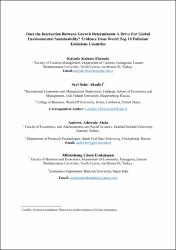Does the Interaction Between Growth Determinants A Drive For Global Environmental Sustainability? Evidence from World Top 10 Pollutant Emissions Countries
Özet
Economic interdependence through foreign direct investment and trade of energy resources in a globalized world filled with mixed heritage sites stimulates economic activities thereby serving as a great catalyst for economic growth. However, the importance of these economies' interdependence transcends economic and sodo-cultural-political benefits to coastal protection, carbon sequestration, flood prevention and soil stabilization among others. To this end, this study seeks to examine whether the interdependence and interaction among foreign direct investment, energy consumption, real income is a drive for global environmental sustainability targets or not. In order to achieve our research objective, we make use of a panel-based study of world's top 10 pollutant emissions that comprises 37 developed countries of the world, using the Dynamic Autoregressive Distributed Lag techniques of Pooled Mean Group, Mean Group and Dynamic Fixed Effects estimators over the periods of 1995-2014 that incorporate tourism as an additional variable. Panel cointegration result shows that increase in the explanatory variables contributes to environmental degradation in the long-run. A 1% increase in kg oil equivalent of energy consumed led to 0.918% increase in environmental degradation, while a 1% increase real income and foreign direct investment decrease environmental degradation by 0.635% and 0.064%, with tourism insignificant impact in the long-run. Consequently, economic and environmental sustainability measures that would help to promote a cleaner and healthy environment globally for both the immediate and future generation were suggested. (C) 2019 Published by Elsevier B.V.
Cilt
705Bağlantı
https://hdl.handle.net/11363/1993Koleksiyonlar
Aşağıdaki lisans dosyası bu öğe ile ilişkilidir:


















